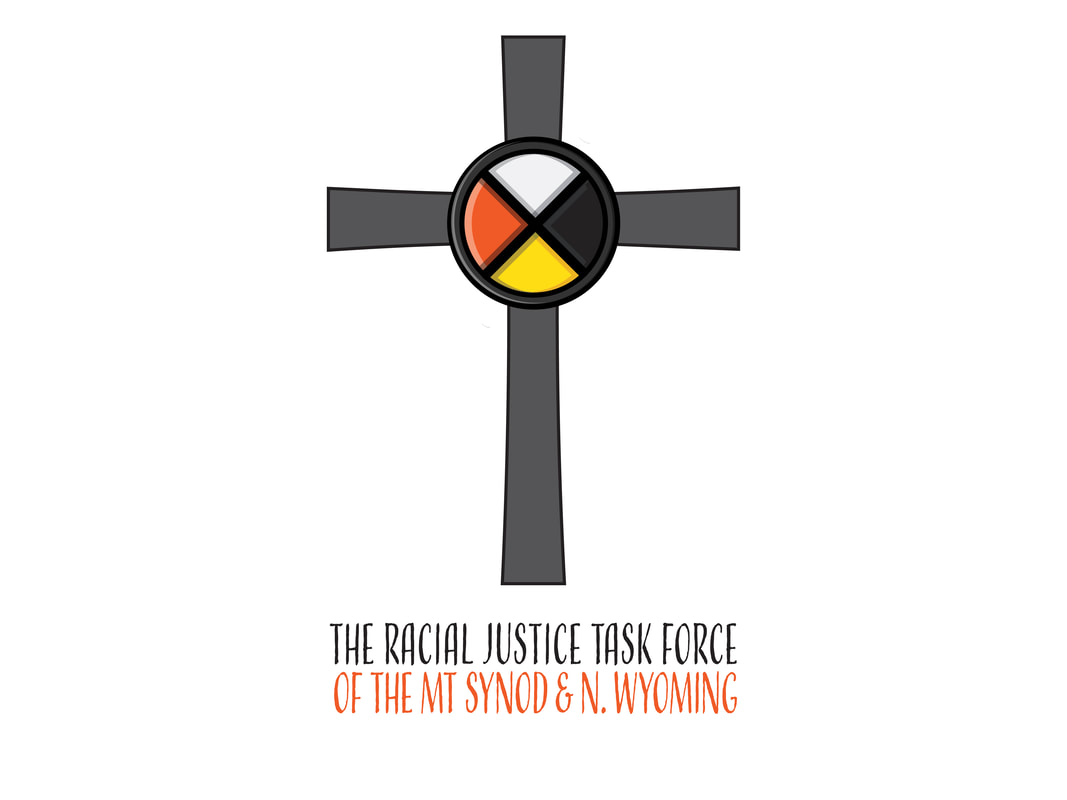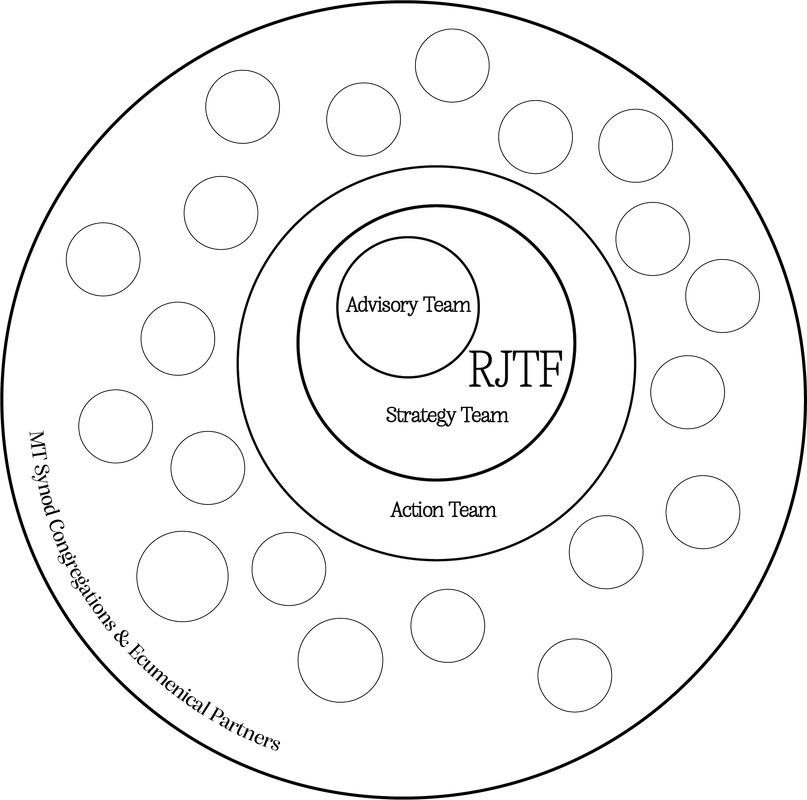About The Racial Justice Task Force of the Montana Synod and Northern Wyoming:
|
Our Beginnings:
In June of 2019, voting members at the Montana Synod Assembly approved a resolution entitled, “Standing for Racial Justice and Cultural Competency in the Montana Synod.” This resolution acknowledged what we’ve done and still need to do as a Christian denomination to reconcile our participation in an American history that has left Indigenous peoples and communities of color fighting to maintain their traditions, customs, and ways of life. Devastating atrocities over time have resulted in ongoing health disparities in Indigenous communities we know concern Christ’s heart and insistent urgings to love our neighbors as ourselves. Therefore, the resolution resolved we assemble a Racial Justice Task Force (RJTF) of the MT Synod that will work to center our conversations on God’s distinct love for diversity founded on definitions of justice declared in our Holy Scriptures. |
Our Goals:
The RJTF has now formed, though it continues to seek expansion. Its members ascribe to two main goals:
The RJTF has now formed, though it continues to seek expansion. Its members ascribe to two main goals:
- Provide educational opportunities for our Synod that focus on the history and effects of colonization in America and Montana specifically, and,
- Using the new understandings we gain, form trusting relationships and strategies for reconciliation alongside Indigenous leaders throughout Montana, ensuring these strategies are based on their discretion according to what’s best for them and their communities.
|
Our Structure: What’s unique about our Task Force? Rather than assuming we know how to offer support, our goal in building trusting relationships with Indigenous leaders includes learning what support looks like to them. First and foremost, our structure and strategies orbit around an Advisory Team comprised of Indigenous leaders and leaders of color. Not all members of the Advisory Team are affiliated with our church, yet all have agreed to advise and counsel our Task Force, particularly our Strategy Team. The Strategy Team is comprised of ELCA MT Synod congregational members and clergy. Per our bylaws, all committees such as our Task Force are required to have a 60/40 composition of lay leaders to clergy members. Participants on our Strategy Team have agreed to partake in the work of our Task Force on at least a monthly basis or more when needed. Finally, our Action Team is comprised of ELCA lay leaders and clergy members interested in the work of the RJTF but whose time commitments need to be more instantaneous or immediate. When called upon by the Advisory and Strategy Teams, our Action Team acts. They also vote on the actions of the Task Force when consensus is needed to engage in broader strategies, our ELCA congregations, and ecumenical partners. |
We Will Have Done Our Work Successfully When:
1. Every clergy person, ELCA member, and congregation within the Montana Synod has easy access to a cultural-competency education such as the series we've assembled and are currently advertising. This series will serve to improve one’s overall understanding of the history and effects of colonization and how communities of color continue to be affected by harmful past and present laws, standards, and social presets that disrupt their complete well-being and ways of life.
2. The importance of restorative racial justice practices can be easily understood, applied, and evaluated by us, the Montana Synod, based on rubrics designed by the leaders of color we work with and alongside. Before we act on issues, we want to hear what restoration and racial justice mean to communities of color throughout Montana. The meaning of justice will certainly vary for each Indigenous tribe or community of color, so our ability to be flexible, empathetic, and understanding will be essential. This ability will be aided and further developed by the insights we receive from our upcoming educational series advertised above.
3. The terms for aid, assistance, trust, and relationship-building are also defined by our Advisory Team and subsequently upheld by our clergy, ELCA members, and congregations. Not the other way around.
4. Before any action takes place, the practices of deep listening are applied when engaging tribal authorities/leaders and leaders of color, knowing that our actions can affect their desired outcomes.
5. We also want the concerns of those we engage to be discerned in terms of their root causes. Success is when we, as non-indigenous, institutional leaders, can read the systemic nature of an issue and take steps to address it appropriately, allowing those affected by any issue to guide our way.
Desired Measurable Outcomes:
We plan to quantitatively measure the success of our task force based on:
1. Every clergy person, ELCA member, and congregation within the Montana Synod has easy access to a cultural-competency education such as the series we've assembled and are currently advertising. This series will serve to improve one’s overall understanding of the history and effects of colonization and how communities of color continue to be affected by harmful past and present laws, standards, and social presets that disrupt their complete well-being and ways of life.
2. The importance of restorative racial justice practices can be easily understood, applied, and evaluated by us, the Montana Synod, based on rubrics designed by the leaders of color we work with and alongside. Before we act on issues, we want to hear what restoration and racial justice mean to communities of color throughout Montana. The meaning of justice will certainly vary for each Indigenous tribe or community of color, so our ability to be flexible, empathetic, and understanding will be essential. This ability will be aided and further developed by the insights we receive from our upcoming educational series advertised above.
3. The terms for aid, assistance, trust, and relationship-building are also defined by our Advisory Team and subsequently upheld by our clergy, ELCA members, and congregations. Not the other way around.
4. Before any action takes place, the practices of deep listening are applied when engaging tribal authorities/leaders and leaders of color, knowing that our actions can affect their desired outcomes.
5. We also want the concerns of those we engage to be discerned in terms of their root causes. Success is when we, as non-indigenous, institutional leaders, can read the systemic nature of an issue and take steps to address it appropriately, allowing those affected by any issue to guide our way.
Desired Measurable Outcomes:
We plan to quantitatively measure the success of our task force based on:
- The number of non-Indigenous, ELCA-church-affiliated yearly participants in our educational series.
- The number of leaders of color on our Advisory Team (also the number of MT reservations and communities of color represented)
- The number of trust-based, developing relationships between RJTF members and Indigenous leaders throughout Montana.
- The number of Montana Synod member attendance and/or presence at Indigenous-led events in Montana
- The number of one-to-one relational meetings with Indigenous leaders
- The number of completed verbal or written reports from BIPOC leaders we work with concerning the efficiency and effectiveness of our work as a task force particularly regarding the actions we take based on their advisement.
- The number of ecumenical partners and community organizations we engage while doing the work we’ve set out to do.
|
Please Consider Donating To Our Work!
|


